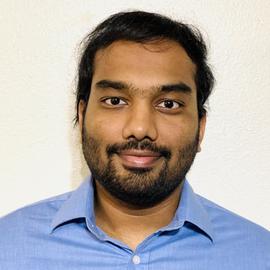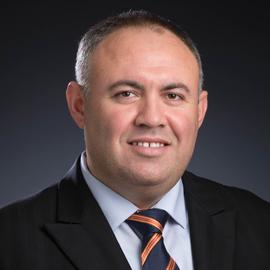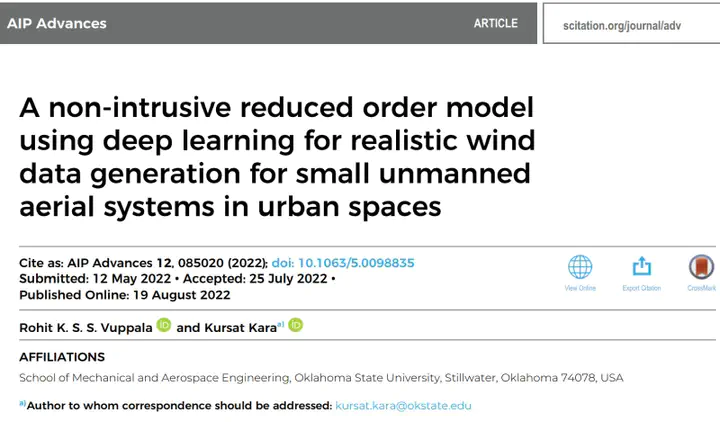A non-intrusive reduced order model using deep learning for realistic wind data generation for small unmanned aerial systems in urban spaces
Rohit Vuppala, Kursat Kara
August, 2022
Abstract
Realistic wind data are essential in developing, testing, and ensuring the safety of small unmanned aerial systems in operation. We present a non-intrusive reduced order modeling (NIROM) approach to replicate realistic wind data and predict wind fields. The method uses a LES model to generate high-fidelity data. To create a reduced-order model, we use proper orthogonal decomposition to extract modes from the three-dimensional space and use specialized recurrent neural networks and long short-term memory to step in time. This paper combines the traditional approach of using computational fluid dynamic simulations to generate wind data with deep learning and reduced-order modeling techniques to devise a methodology for a non-intrusive data-based model for wind field prediction. A model of an urban subspace with a building setup in neutral atmospheric conditions is tested to demonstrate the method.

Rohit Vuppala
Ph.D., Current Position: University of Chicago

Kursat Kara
Associate Professor, Mechanical and Aerospace Engineering
Kursat Kara is an Associate Professor of Mechanical and Aerospace Engineering at Oklahoma State University and principal investigator of the Kara Aerodynamics Research Laboratory. His research spans hypersonic boundary-layer physics, unsteady aerodynamics, and the emerging interface of quantum computing and fluid dynamics. A dedicated educator and mentor, he teaches core and advanced courses—including Fundamentals of Aerodynamics, Computational Fluid Dynamics, Boundary-Layer Theory and Transition, and Quantum Computing—and supervises graduate and undergraduate projects in high-fidelity simulation and data-driven modeling. His work has been funded by NASA, NSF, Oklahoma NASA-EPSCoR, NAVAIR, ANSYS, and IBM Quantum. In 2025, he received the CEAT Excellent Faculty Award and was nominated for both the 2024 Excellent Teacher Award and the 2025 Excellent Faculty Award by OSU’s School of Mechanical and Aerospace Engineering. Dr. Kara earned his Ph.D. from Old Dominion University with a dissertation on hypersonic boundary layer receptivity to acoustic disturbances. He began his career as a research engineer at New England Analytics (supporting Sikorsky Aircraft), then completed a post-doctoral appointment at Penn State in hot jet simulations for aeroacoustics. In 2010, he helped establish the Aerospace Engineering Department at Khalifa University—where he won the President’s Faculty Excellence Award for Outstanding Teaching in 2015—before joining OSU. An active member of AIAA and APS, he served on the AIAA Applied Aerodynamics Technical Committee (2012–2021) and chaired/co-chaired multiple AIAA conferences. He also sits on the editorial board of Nature Scientific Reports and guest-edits its Quantum Computing collection.
